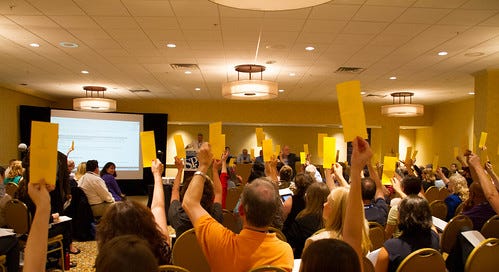I awoke today with plans to write about something else, but something a colleague mentioned to me yesterday led me to an ‘a-ha’ moment this morning. Bear with me, as it needs a little set up:
My parents came to Unitarianism (pre-consolidation) from other faiths, having found that our emphasis on humanity and reason attractive and meaningful. A few years before I was born, they moved our family too far from a Unitarian (now UU) congregation, but they still knew we kids needed religious education. They found that the local Methodist minister was more theologically aligned with them than they expected, and they felt confident in sending us there - and becoming somewhat involved in the congregation themselves (my mom was the star of the church crafts bazaar). My brother, sister, and I got religious education, for sure, but we also learned how to church.
And what that meant is that during my 20s and 30s, when I sowed my spiritual oats, I had some basic understanding of how to be in those spaces (yes, even pagan spaces). I knew that there were some ways to behave in ways that honor others and create a sense of community. I knew why we do various basic things (gather, give, sing together, get involved, teach) both in and outside of the main ritual space. I knew what it meant to live our values - and saw what happened when we didn’t - both inside and outside the community. And I knew that to be part of a religious community was to support the common endeavor.
So when I joined a Unitarian Universalist congregation in the early 2000s, I knew how to church, and that while we had different words for it (namely, covenant), I understood what was being asked of me.
I learned how to church1.
But many others haven’t.
And here’s where my colleague’s comment comes in: they told me that for a paper on congregational polity, they learned that the UUA used to have curricula for congregations on good church-person-ship. Understanding what it means to be a member, to be in covenant, to support the common endeavor.
That means things like supporting a decision if fairly and honestly made, even if it wasn’t your preference. It means looking to the future and trusting those with vision, even if it wasn’t your vision. It means support the religious professionals and affirming their ministries. It means teaching others, and helping them along even as you were helped along when you first arrived. It means doing the work to support the congregation - helping out, taking on leadership roles, being engaged with each other.
In Christianity, we’d call it discipleship. In Unitarian Universalism, we like “being in covenant” because it’s less of a demand and more of an agreement.
But for those who never learned how to church (whether by circumstance or by choice), it must be baffling and seemingly at odds with who we proclaim to be.
Or at least the impression of who we proclaim to be.
Because some of you don’t get that covenant isn’t a restriction of personal freedom and self-reliance - all it is, really, is how to church. How to be in community with one another. How to support each other in our search for truth and meaning. How to be generous with each other and our communities. How to affirm and promote each other’s worth and dignity. How to work together for the congregation’s common endeavor, and ultimately humanity’s common endeavor.
No wonder some of you bristle so hard at the idea of covenant. You never learned that it’s part of how to church.
Maybe we need to bring those classes back.
I know we use various terms for our faith communities; in this instance I am using “how to church” as an easy metaphor for the bigger message. Please don’t let my choice of nomenclature keep you from hearing what I am saying.





I've asked the colleague mentioned in the post if she has notes of where she saw the reference - but we definitely need to track it down.
Also, some of us are talking about updating/writing one.
Yes, I would love to see this old curriculum. As you may know, I did not grow up in church though I did attend churches as a teen. At this point, I see more people in our congregations that did grow up in church and are intent on throwing off all the trappings of such. That's a struggle, as well. And I know you know that.